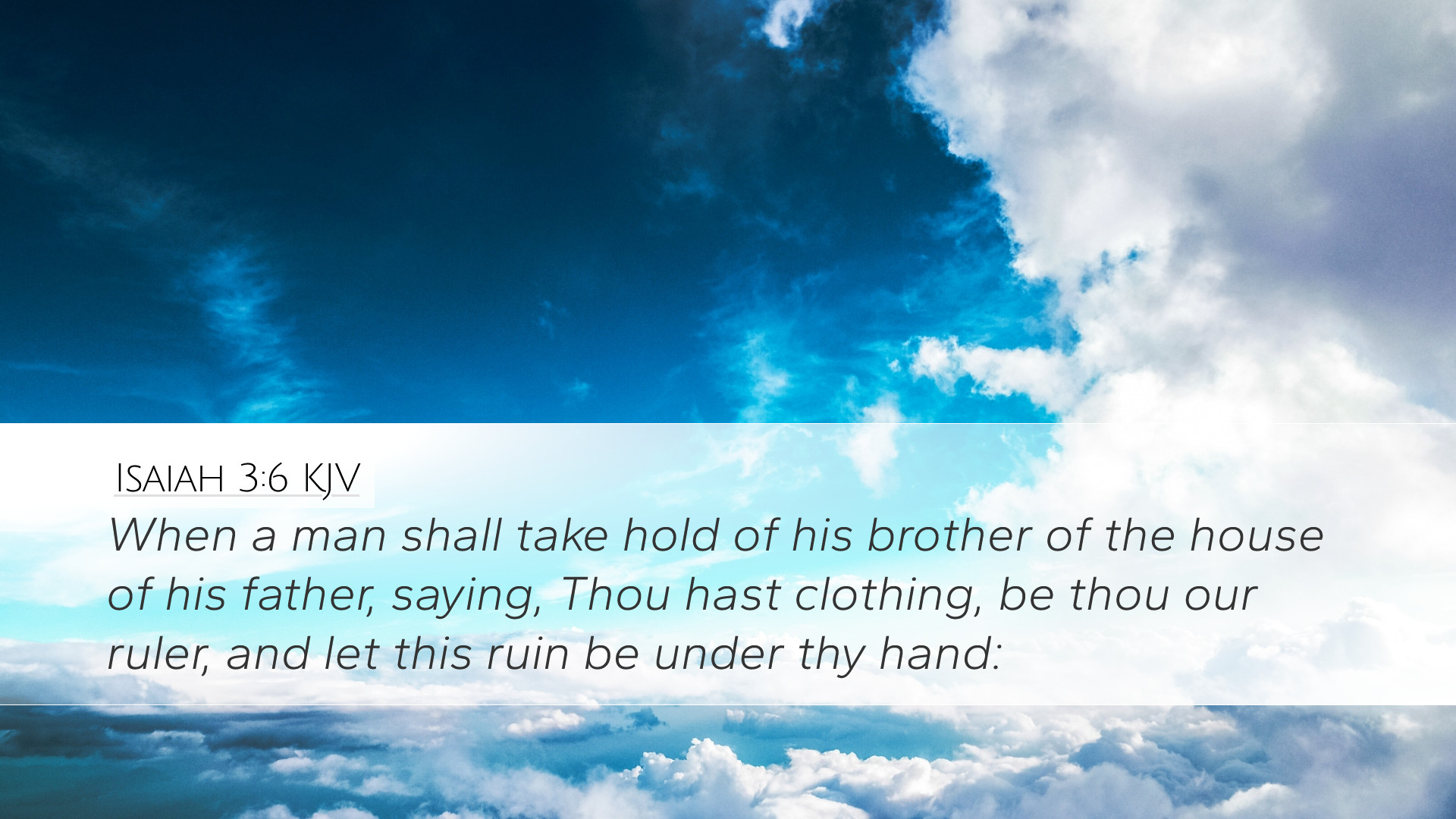Commentary on Isaiah 3:6
Isaiah 3:6 states: "When a man shall take hold of his brother of the house of his father, saying, 'Thou hast clothing, be thou our ruler, and let this ruin be under thy hand'". This verse serves as a poignant depiction of societal breakdown during times of judgment and calamity. Various commentaries provide rich insights into this multifaceted verse, highlighting its relevance for pastors, students, theologians, and Bible scholars.
Contextual Framework
The backdrop of this scripture is critical to fully grasping its implications. Isaiah, one of the major prophets, prophesied during a turbulent period in Israel’s history, characterized by moral decay, idolatry, and social injustice. His messages often depict God's judgment against both Israel and Judah for their unfaithfulness. According to Matthew Henry, this chapter outlines the impending consequences of these transgressions, illustrating a community stripped of its social and spiritual order.
Social Order and Leadership
The image of a man clamoring for leadership due to dire circumstances reflects a deeper message about the nature of leadership and societal structure. Albert Barnes emphasizes that the struggle for power in times of crisis often leads to imprudent and unqualified leaders. In this particular verse, one brother appealingly addresses another about leadership, not from a place of wisdom or rightful authority, but rather out of desperation to salvage the situation. As society collapses, the true leaders—those appointed by God—are absent or unwilling to rise to the occasion.
Desperation in Leadership
Henry notes that this plea signifies a breakdown in traditional structures of authority. The call for a leader based on mere possession of clothing illustrates a superficial understanding of what qualifies someone to lead. It underscores the moral and spiritual bankruptcy that has overtaken the nation. In such chaotic situations, the default becomes a cry for help rather than a seeking out of those endowed with divine wisdom or guidance.
Implications for the Church Today
This verse resonates profoundly with contemporary issues faced within church and society. Adam Clarke comments on the modern applicability of this prophetic insight, suggesting that in times of fear and uncertainty, the church must be wary of selecting leaders based on external appearances rather than spiritual integrity. True leadership is a divine calling grounded in character and the wisdom of God—qualities often overlooked in pressing situations.
Criteria for Leadership
As noted by Barnes, the criteria for choosing leaders should be rooted in spiritual qualifications rather than mere functionality during a crisis. The search for leaders during emergencies often leads congregations and communities to err by elevating individuals who may lack the genuine qualities needed to guide them faithfully. Clarke argues that the church must emphasize equipping potential leaders with solid theological training and practical experience, fostering a culture of spiritual discernment.
Crisis and Its Revealing Nature
Isaiah 3:6 not only underscores the desperation of the times but also serves as a mirror to the condition of the human heart when faced with crisis. Henry observes that crises often reveal true character, whether in individuals or nations. In the midst of societal upheaval, communities may find themselves turning to those they would otherwise overlook, reflecting the inherent human need for security and direction.
Learning from Adversity
In Isaiah’s time, the call for a leader amid ruin speaks to the urgency of reliance on those who truly understand God’s plan. Clarke remarks that adversity can refine faith, driving communities back to seek God’s appointed leaders. This verse encourages a profound inquiry into the spiritual state of leaders and followers alike, prompting a reflection on who truly deserves authority during challenging times.
Conclusion: A Call for Discernment
Isaiah 3:6 serves both as a warning and a lesson. As highlighted in various commentaries, this verse is a clarion call for discernment in leadership during turbulent times. As ministers, lay leaders, and congregants, the challenge lies in committing to God’s standards for leadership, recognizing that true governance stems from a heart aligned with the will of God.
In conclusion, as we navigate the complexities of leadership in our own contexts, may Isaiah's prophetic words lead us toward a deeper understanding of God’s design for authority and the importance of faithful stewardship in our communities.


